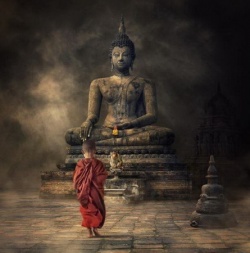Difference between revisions of "Alaya"
m (1 revision: Adminos 13 OCTOBERR) |
|||
| Line 1: | Line 1: | ||
[[File:Munk66814 n.jpg|thumb|250px|]] | [[File:Munk66814 n.jpg|thumb|250px|]] | ||
| + | <poem> | ||
{{Seealso|Eight Consciousnesses|Eight consciousnesses}} | {{Seealso|Eight Consciousnesses|Eight consciousnesses}} | ||
| − | [[ālaya]] : [m.] 1. [[abode]]; roosting place; 2. [[desire]]; [[attachment]]; 3. pretence. | + | [[ālaya]] : [m.] [[Alaya]] |
| + | An abbreviation of [[Alaya-vijanana]]. [[Alaya]] is a sort of [[eternal]] [[substance]] or {{Wiki|matter}}, creative and containing all [[forms]]; when considered as a whole, it is {{Wiki|non-existent}}, or contains nothing; when considered [[phenomenal]], it fills the [[universe]]. It seems to be of the [[nature]] of {{Wiki|materialism}}. It is the store or {{Wiki|totality}} of [[consciousness]] both [[absolute]] and [[relative]]. It is described as the fundamental [[mind-consciousness]] of [[conscious]] [[beings]], which lays hold of all the [[experience]] of the {{Wiki|individual}} [[life]], and which stores and holds the germs of all affairs. | ||
| + | |||
| + | It is the last of [[Eighth Consciousness]] from which the [[Wisdom of Great Round Mirror]] is derived. | ||
| + | |||
| + | 1. [[abode]]; [[roosting place]]; | ||
| + | 2. [[desire]]; [[attachment]]; | ||
| + | 3. pretence. | ||
---------------------------<br/><br/> | ---------------------------<br/><br/> | ||
| − | '''[[Alaya]]''' (Skt. ''[[ālaya]]''; Tib. {{BigTibetan|[[ཀུན་གཞི་]]}}, ''[[kun shyi]]''; Wyl. ''[[kun gzhi]]'') — the [[universal]] | + | '''[[Alaya]]''' (Skt. ''[[ālaya]]''; Tib. {{BigTibetan|[[ཀུན་གཞི་]]}}, ''[[kun shyi]]''; [[Wyl.]] ''[[kun gzhi]]'') — the [[universal ground]] or basis. [[Longchenpa]] describes [[alaya]] in this way: |
{| class="wikitable" style="color:black;background-color:#f7f7e7;" cellspacing="5" border="0" text-align:left,top" | {| class="wikitable" style="color:black;background-color:#f7f7e7;" cellspacing="5" border="0" text-align:left,top" | ||
|+ | |+ | ||
|valign="top"| | |valign="top"| | ||
| − | “It is unenlightenment and a | + | “It is [[unenlightenment and a neutral state]], which belongs to the category of [[mind]] and {{Wiki|mental events}}, and it has become the foundation of all [[karma]]s and ‘[[Habitual tendencies|traces]]’ of [[samsara]] and [[nirvana]].”<ref>From the ''[[Treasury of Word and Meaning]]''; translation from [[Tulku Thondup]] in ''[[The Practice of Dzogchen]]'' (Ithaca: Snow Lion, 1996 & 2002), page 211.</ref> |
| | | | ||
| − | {{BigTibetan|༈ ངོ་བོ་ནི་སེམས་སེམས་བྱུང་གིས་ཉེ་བར་བསྡུས་པས་འཁོར་འདས་ཀྱི་ལས་དང་བག་ཆགས་ཐམས་ཅད་ཀྱི་རྟེན་དུ་གྱུར་པ་སྟེ། | + | {{BigTibetan|༈ [[ངོ་བོ་ནི་སེམས་སེམས་བྱུང་གིས་ཉེ་བར་བསྡུས་པས་འཁོར་འདས་ཀྱི་ལས་དང་བག་ཆགས་ཐམས་ཅད་ཀྱི་རྟེན་དུ་གྱུར་པ་སྟེ། མ་རིག་པའི་ལུང་མ་བསྟན་ཏེ]]།}} |
|} | |} | ||
In the [[Lamdré]] teachings however, it refers to the indivisible union of [[awareness]] and [[emptiness]]. This is also how the term is used when it appears in the [[Seven Points of Mind Training]]. | In the [[Lamdré]] teachings however, it refers to the indivisible union of [[awareness]] and [[emptiness]]. This is also how the term is used when it appears in the [[Seven Points of Mind Training]]. | ||
| Line 21: | Line 29: | ||
==Further Reading== | ==Further Reading== | ||
*[[Tulku Thondup]], ''[[The Practice of Dzogchen]]'' (Ithaca: [[Snow Lion Publication]], 1996), pages 210-212. | *[[Tulku Thondup]], ''[[The Practice of Dzogchen]]'' (Ithaca: [[Snow Lion Publication]], 1996), pages 210-212. | ||
| − | + | </poem> | |
{{R}} | {{R}} | ||
[http://dictionary.buddhistdoor.com/en/word/706/alaya dictionary.buddhistdoor.com]<br/> | [http://dictionary.buddhistdoor.com/en/word/706/alaya dictionary.buddhistdoor.com]<br/> | ||
Revision as of 09:28, 18 April 2014
- See also :
- See also :
ālaya : [m.] Alaya
An abbreviation of Alaya-vijanana. Alaya is a sort of eternal substance or matter, creative and containing all forms; when considered as a whole, it is non-existent, or contains nothing; when considered phenomenal, it fills the universe. It seems to be of the nature of materialism. It is the store or totality of consciousness both absolute and relative. It is described as the fundamental mind-consciousness of conscious beings, which lays hold of all the experience of the individual life, and which stores and holds the germs of all affairs.
It is the last of Eighth Consciousness from which the Wisdom of Great Round Mirror is derived.
1. abode; roosting place;
2. desire; attachment;
3. pretence.
Alaya (Skt. ālaya; Tib. ཀུན་གཞི་, kun shyi; Wyl. kun gzhi) — the universal ground or basis. Longchenpa describes alaya in this way:
“It is unenlightenment and a neutral state, which belongs to the category of mind and mental events, and it has become the foundation of all karmas and ‘traces’ of samsara and nirvana.”[1] |
༈ [[ངོ་བོ་ནི་སེམས་སེམས་བྱུང་གིས་ཉེ་བར་བསྡུས་པས་འཁོར་འདས་ཀྱི་ལས་དང་བག་ཆགས་ཐམས་ཅད་ཀྱི་རྟེན་དུ་གྱུར་པ་སྟེ། མ་རིག་པའི་ལུང་མ་བསྟན་ཏེ]]། |
In the Lamdré teachings however, it refers to the indivisible union of awareness and emptiness. This is also how the term is used when it appears in the Seven Points of Mind Training.
==See Also==
Footnotes
- ↑ From the Treasury of Word and Meaning; translation from Tulku Thondup in The Practice of Dzogchen (Ithaca: Snow Lion, 1996 & 2002), page 211.
==Further Reading==
- Tulku Thondup, The Practice of Dzogchen (Ithaca: Snow Lion Publication, 1996), pages 210-212.
